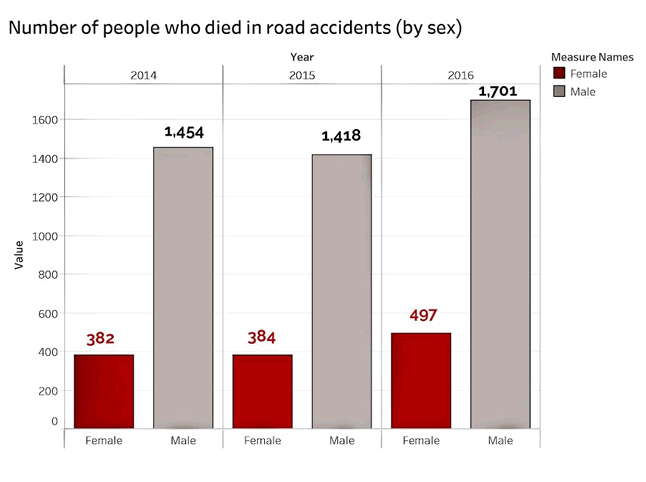More men are killed in road accidents than women – NRSC
 The 2016 provisional data on road accidents provided by the National Road Safety Commission (NRSC) has shown that 1,701 men were killed in road accidents, three times more than the 497 women killed.
The 2016 provisional data on road accidents provided by the National Road Safety Commission (NRSC) has shown that 1,701 men were killed in road accidents, three times more than the 497 women killed.
The trend could also be seen in the previous years with 2015 recording 1,418 men and 384 women killed while 2014 saw 1,454 men and 382 women killed.
Kwame Kodua Atuahene, the Head of Communications of NRSC, in an interview with the Ghana News Agency, said a possible reason for more men dying in road accidents than women could be that men were active in the transport sector than women.
However, he noted that the explanation could be too simplistic as the number of death recorded included both passengers, commercial drivers, private drivers and other road users.
Despite the NRSC’s interventions, the number of deaths in road accidents in the first quarter have increased compared to that of 2016.
A total of 530 deaths were recorded in the first quarter of 2017 compared to 508 for the same period in 2016.
Mr Atuahene said generally that level of increase was as a result of vehicle population, new road networks, and the condition of roads.
He said there were three ways of measuring a country’s performance in curbing road accidents: “the fatality rate which is the number of deaths per 10,000; the level of risk; and the actual number of people dying. In all of these indices we notice that we are making some improvement.”
“Pedestrian death is down from 43 to 38 per cent, passenger deaths are down from 23 to about 18 per cent. On the basis of those indicators, it is fair to suggest that the programmes that we run seem to make some impact,” Mr Atuahene said.
Comparing the figures, the number of road accidents is on the decline but shot up in 2016.
The number of pedestrian knock downs increased from 2,121 in 2015 to 2,961 in 2016. The number of persons killed also increased from 1,634 in 2015 to 2,198 in 2016.
“It is difficult to tell the reason except to assume that the election may have played a role. Out of our observation, we see that in election years there is a breakdown in the level of law enforcement and discipline,” Mr Atuahene said.
He recalled the Police Administration’s directive to personnel of the Motor Traffic and Transport Department of the Ghana Police Service to suspend all motor checks in the country prior to the election.
The directive, signed by the Director-General of the Police Administration, Commissioner of Police, Mr Ransford Moses Ninson, asked the highway patrol units of the police to “only check for arms and ammunition and drugs”.
“It may be too simplistic to say that it is just the political parties and their misconduct accounts for this. We want to investigate the system in order to assign very prudent scientific reasons as to why this happens,” he said.
He said the target of the NRSC is to hit a single fatality rate by the year 2020.
Source: GNA
